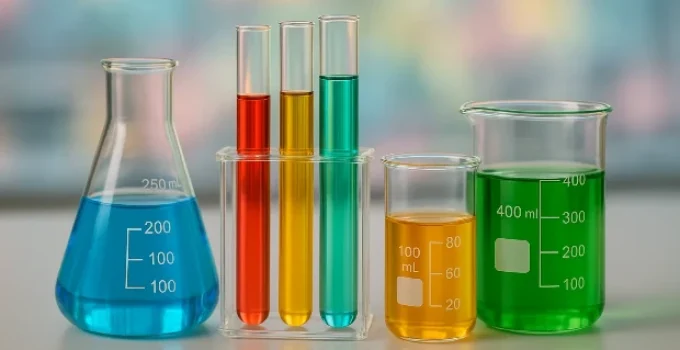What Is the Difference Between a Compound and Mixture?
✅ Answer:
The difference between a compound and a mixture is that a compound is made of two or more elements chemically bonded together, while a mixture is made of two or more substances physically combined without forming new chemical bonds. Compounds have new properties, but mixtures keep the original properties of their parts.
🧭 Dive Deeper:
- What Is a Compound?
- What Is a Mixture?
- Key Differences Between Compounds and Mixtures
- How to Tell Them Apart
- Examples in Everyday Life
- Why This Matters in Science
- 🎯 Final Thoughts
- 📚 References
What Is a Compound?
A compound is a pure substance formed when two or more elements are chemically combined in a fixed ratio. This means the atoms are bonded together to form something new.
Once a compound forms:
- The original elements lose their individual properties.
- The compound has new characteristics.
🧪 Example:
Water (H₂O) is a compound made from hydrogen and oxygen. Alone, hydrogen is explosive, and oxygen helps things burn—but water is safe to drink!
What Is a Mixture?
A mixture is made when two or more substances are physically combined—not chemically bonded.
In a mixture:
- Each part keeps its own properties.
- The substances can be easily separated by physical means like filtering, sifting, or evaporation.
🥣 Example:
If you mix sand and salt, you get a mixture. You can still see and feel both parts, and you can separate them with water and a filter.
Key Differences Between Compounds and Mixtures
| Feature | Compound | Mixture |
|---|---|---|
| Bond Type | Chemically bonded | Physically combined |
| New Properties? | Yes | No, original properties stay |
| Can Be Separated Easily? | ❌ No (requires chemical change) | ✅ Yes (physical methods) |
| Fixed Ratio? | ✅ Yes (always the same) | ❌ No (amounts can vary) |
| Example | Water (H₂O), Salt (NaCl) | Trail mix, air, saltwater |
🧬 Science Tip:
If it forms a new substance with new properties, it’s a compound. If you can pick it apart, it’s a mixture.
How to Tell Them Apart
Ask yourself these questions:
- Are the substances chemically bonded?
- Yes → Compound
- No → Mixture
- Can the parts be separated easily?
- Yes → Mixture
- No → Compound
- Do the properties change?
- Yes → Compound
- No → Mixture
🔍 Simple Test Example:
Mix iron filings and sulfur—you can still separate them with a magnet. But if you heat them together, they form iron sulfide, a compound you can’t separate easily.
Examples in Everyday Life
✅ Compounds
- Water (H₂O) – Hydrogen + Oxygen
- Carbon dioxide (CO₂) – Carbon + Oxygen
- Table salt (NaCl) – Sodium + Chlorine
✅ Mixtures
- Trail mix – Nuts, raisins, chocolate chips
- Air – A mix of nitrogen, oxygen, and other gases
- Saltwater – Salt dissolved in water (can be evaporated)
🌍 Fun Fact:
The air you breathe is a mixture, but the carbon dioxide inside it is a compound!
Why This Matters in Science
Knowing the difference helps scientists:
- Understand how substances interact
- Create new materials, like medicines and metals
- Separate and purify substances in chemistry labs
It also helps us in daily life—whether it’s mixing ingredients in cooking or separating materials in recycling.
👨🍳 Cooking Connection:
Baking soda and vinegar create a chemical reaction that forms a compound (carbon dioxide gas), while a salad is just a mixture of ingredients.
🎯 Final Thoughts
So, what is the difference between a compound and mixture? A compound forms when substances chemically bond and create something new, while a mixture just combines things physically, keeping their original properties.
From trail mix to table salt, understanding this difference helps us see how the world is made—and how it can change.
📚 References
- BBC Bitesize. “Elements, Compounds and Mixtures.”
https://www.bbc.co.uk/bitesize/articles/zngddp3 - CK-12 Foundation. “Elements, Compounds, and Mixtures.”
https://flexbooks.ck12.org/cbook/ck-12-middle-school-life-science-2.0/section/2.1/related/lecture/elements-compounds-mixtures/ - ChemTalk. “Mixtures vs Compounds.”
https://chemistrytalk.org/mixtures-vs-compounds/
📌Learn More About Compounds
- What’s the Difference Between Organic and Inorganic Compounds? 🌿⚗️
- What’s the Difference Between Elements and Compounds? ⚛️🔬
- What Is the Difference Between Atoms and Molecules? ⚛️🧪
- What Is the Difference Between Molecules and Compounds⚛️🧬
- What Are Ionic and Covalent Compounds?⚛️
